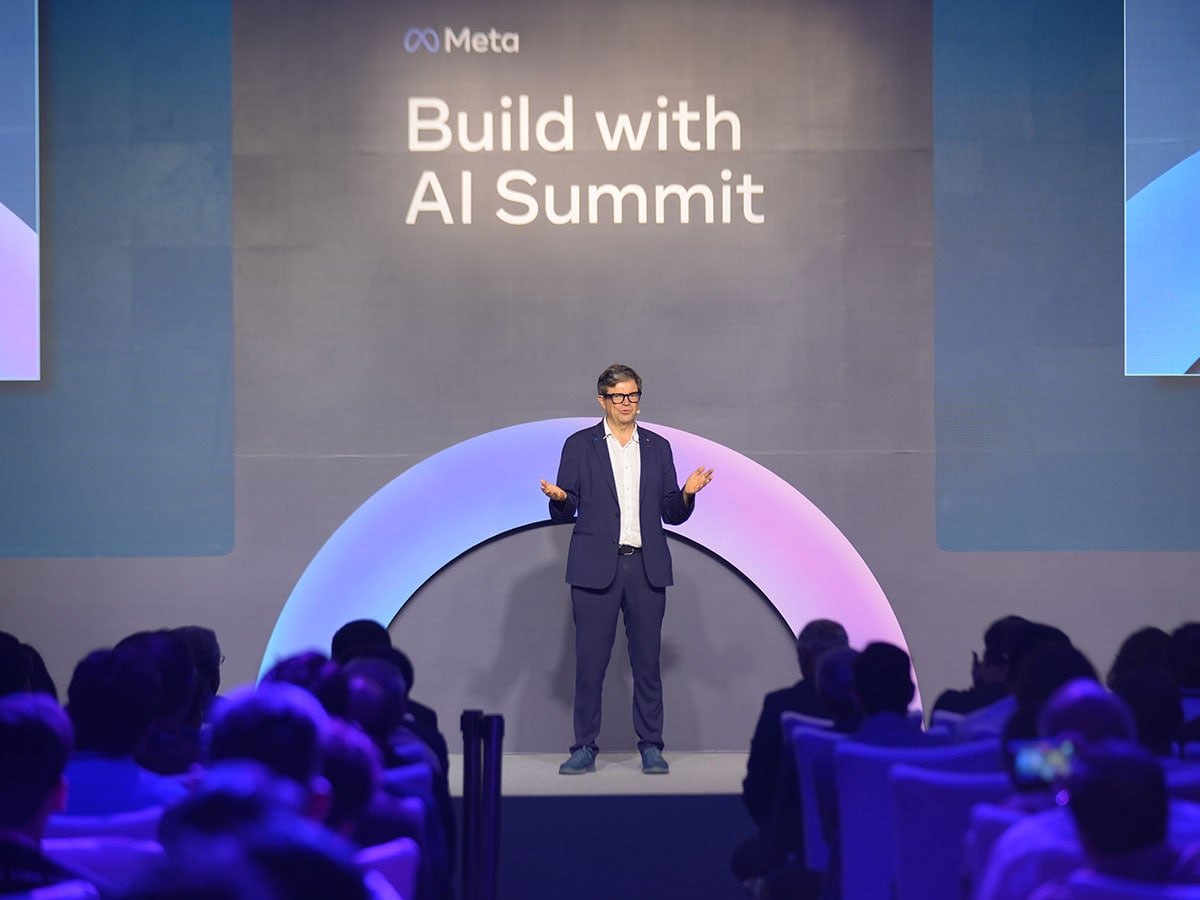
As AI continues to evolve, India will play a pivotal role in driving innovation globally: Meta's Chief AI Scientist Yann LeCun
At the Meta Build with AI Summit in Bengaluru on Wednesday, the vice president of Meta spoke about the future of artificial intelligence, rich talent pool in India and more
 Yann LeCun, VP and chief AI scientist at Meta, emphasises the importance of India in making contributions to AI at the Build with AI Summit held in Bengaluru on October 23, 2024.
Yann LeCun, VP and chief AI scientist at Meta, emphasises the importance of India in making contributions to AI at the Build with AI Summit held in Bengaluru on October 23, 2024.
“India holds immense potential in shaping the future of AI (artificial intelligence), not just in product development but also in cutting-edge research. With its rich talent pool and vibrant tech ecosystem, India is already making significant strides,” said Yann LeCun, VP and chief AI scientist at Meta, at the Meta Build with AI Summit in Bengaluru on Wednesday. “The country's contributions to AI, particularly in areas like natural language understanding, are vital for advancing technologies that can serve diverse populations. As AI continues to evolve, India is poised to play a pivotal role in driving innovation on a global scale,” he added.
Earlier this year, Meta rolled out Meta AI—an AI assistant across all its apps such as WhatsApp, Instagram, Facebook and Messenger—for India. Since then, Meta AI is on track to become the most-used AI assistant in the world by the end of the year with almost 500 million active users monthly. India currently represents the largest market for Meta AI.
“We believe that India can innovate at the bleeding edge of AI, just like we did with mobile internet that transformed how we engage with technology in our day-to-day lives,” said Sandhya Devanathan, vice president and head, Meta India. In this, open-source models will fuel this evolution while also enabling developers, educational institutions, government agencies and enterprises to build cost-effective, scalable solutions tailored to India’s unique challenges.
LeCun added, “From inference optimisation to advancements in natural language processing, the open-source community consistently surprises us with breakthroughs. Our hope is to build AI systems that not only empower individuals but also drive societal transformation, creating a shared AI infrastructure that reflects the world’s diversity in languages, cultures and values.” Meta’s open-source AI models, such as Llama 3.1, provide Indian developers with the tools to create AI solutions that address local challenges across sectors like health care, agriculture and governance.
Government partnerships
They have also recently partnered with the Andhra Pradesh state government to enhance public service delivery using Meta’s WhatsApp Business Solution and open-source gen AI like Llama to provide citizen-centric services via WhatsApp, enabling seamless government-citizen communication. Additionally, in partnership with the Telangana state government, Llama models are being used to enhance public service delivery, optimising processes for government departments and agencies. “We also collaborated with IndiaAI and the Ministry of Electronics and Information Technology (MeitY) last year to advance AI research and development, and with NLSIU and IIT-Bombay on a project with the Department of Consumer Affairs (DoCA) to leverage LLMs for legal reforms, building a citizen-centric chatbot and decision-assist tools for consumer law,” added Devanathan.Also read: Shaping India's future with AI skills and jobs
AI for skilling
Initiatives like the Skill AI Chatbot, launched in partnership with the Ministry of Skill Development and Entrepreneurship (MSDE), are ensuring that AI-driven education reaches the masses. The chatbot, available in multiple Indian languages, helps citizens access job listings, skilling centres, and learning resources. “Our open-source models are also being used in education-focussed initiatives such as Arivihan, India’s first fully automated online learning platform,” she added. Powered by Llama models, Arivihan generates personalised lecture scripts and answers to over 100,000 student queries, democratising high-quality education at scale. Additionally, AI4Bharat and startups such as Sarvam AI are advancing AI for Indic languages, creating Hindi LLMs (large language models) while operating under limited resources.


















